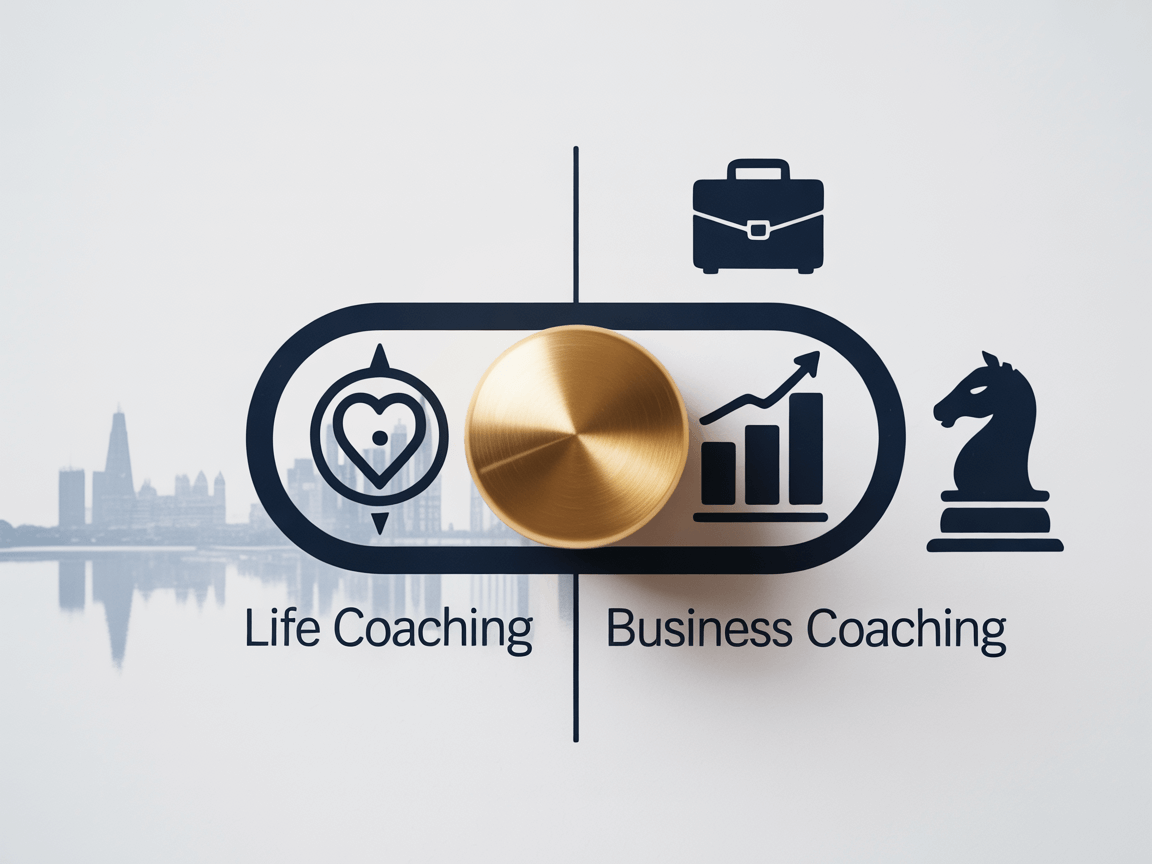Standing at a crossroads in your career or personal life, you know you need help – but should you hire a life coach or a business coach?
This decision not only shapes your investment but also influences the entire trajectory of your personal and professional development. Choose correctly, and you’ll accelerate your growth beyond what you thought possible. Choose poorly, and you might spend months working on the wrong areas whilst your real challenges remain unaddressed.
After two decades of coaching entrepreneurs and witnessing the confusion many face when choosing between life coaching and business coaching, I’ve developed a clear framework for making this crucial decision. The truth is, the boundaries between life and business coaching aren’t as clear-cut as you might think, and understanding these nuances could save you significant time and money.
What you’re about to discover will clarify exactly which type of coaching matches your current needs and how to maximise your return on this significant investment in yourself.
What Is the Difference Between a Life Coach and a Business Coach?
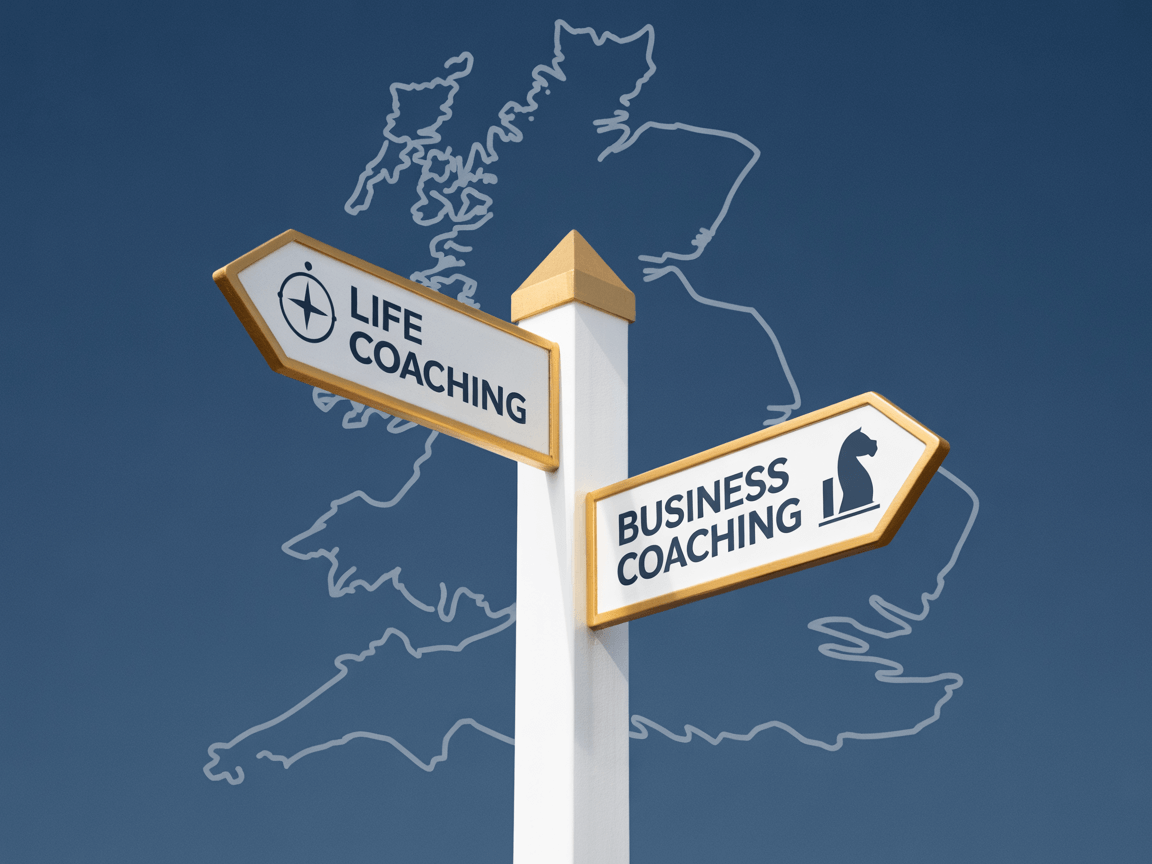
The fundamental difference lies in scope and focus, though the boundaries often blur in practice.
A life coach takes a holistic approach to your entire life experience. They work with you on personal fulfilment, relationships, health, life transitions, goal achievement, and overall wellbeing. Life coaches help you identify what truly matters to you and create alignment between your values, actions, and outcomes across all areas of life.
A business coach focuses specifically on your professional development and business success. They concentrate on leadership skills, strategic thinking, business growth, team management, decision-making, and achieving measurable business outcomes. Business coaches bring industry experience and practical business knowledge to help you navigate professional challenges.
Here’s where it gets interesting: many successful coaching relationships transcend these boundaries. When I work with entrepreneurs, we inevitably discuss how business stress affects their family life or how personal confidence impacts their leadership effectiveness. Your business success and personal well-being are inextricably linked, particularly if you’re a business owner or senior executive.
The key distinction isn’t necessarily what topics you discuss, but rather the primary lens through which your coach approaches your development. A life coach might address your business challenges through the framework of personal fulfilment and life balance. A business coach may address your stress and confidence issues specifically as they relate to your professional performance.
Scope of Practice Differences
| Area | Life Coaching Focus | Business Coaching Focus |
|---|---|---|
| Core Direction | Personal goal setting and achievement | Strategic planning and business development |
| Lifestyle Balance | Work-life balance and lifestyle design | Leadership and management skills |
| Relationships | Relationship dynamics and communication | Team building and organisational development |
| Confidence & Growth | Personal confidence and self-esteem | Financial management and growth strategies |
| Adaptation | Life transitions and major decisions | Market positioning and competitive advantage |
| Wellness | Health and wellness integration | Operational efficiency and systems |
| Development | Spiritual and personal growth | Professional networking and industry relationships |
Methodology and Approach Differences
Life coaching methodology
tends to be more exploratory and values-based. Life coaches often use techniques from psychology, wellness practices, and personal development frameworks. The approach is typically more intuitive and personalised to your individual life circumstances.
Business coaching methodology is more structured and results-oriented. Business coaches utilise proven business frameworks, industry best practices, and measurable outcomes. The approach is more systematic and focused on specific professional competencies.
Both approaches have merit, and the best choice depends on your current priorities and challenges.
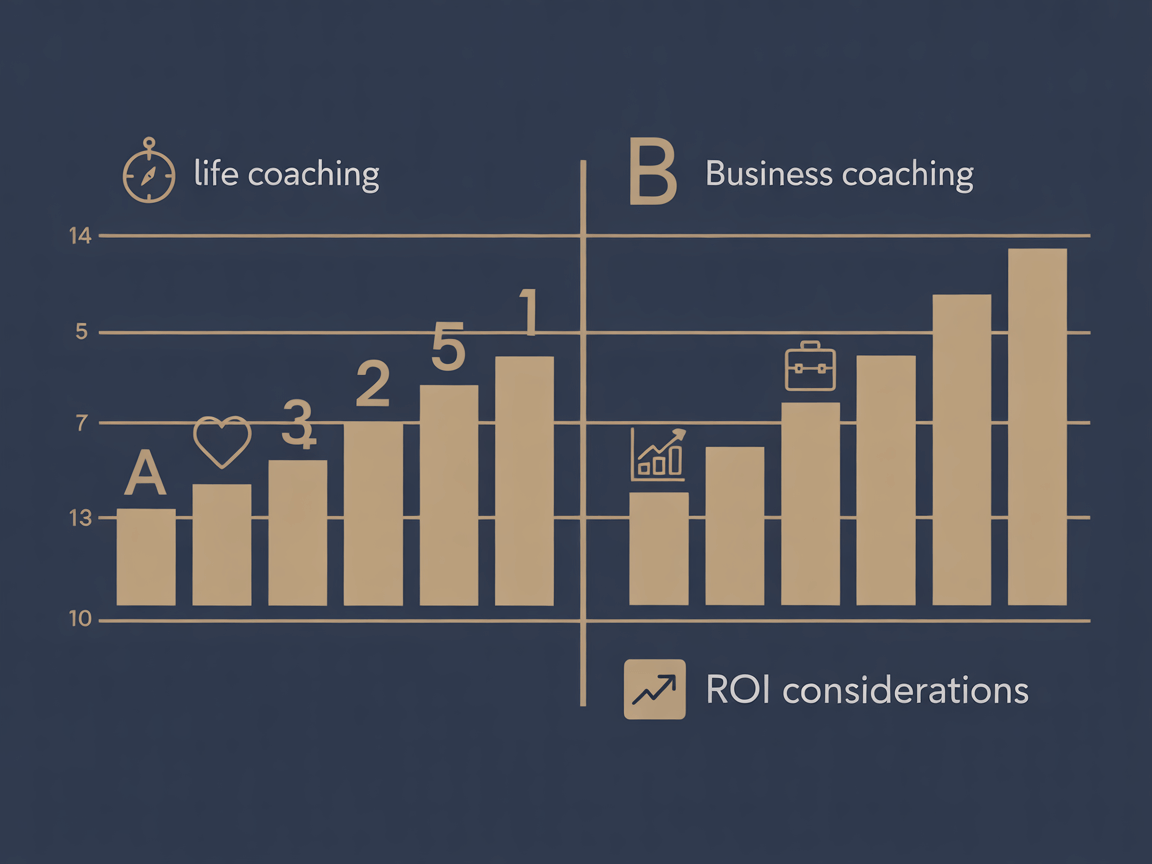
What Type of Person Needs a Life Coach?
Life coaching proves most valuable for individuals experiencing specific life circumstances or seeking particular types of growth.
People in Major Life Transitions
Life coaches excel at supporting people navigating significant changes. This includes career transitions, relationship changes, geographical moves, health challenges, or important life milestones. If you’re feeling stuck or uncertain about direction during a transition period, a life coach can provide clarity and support.
Consider Maria, a senior marketing executive who felt successful professionally but increasingly unfulfilled personally. She was questioning whether her high-pressure career aligned with her values and family priorities. A life coach helped her explore what truly mattered to her and develop a plan for creating better alignment between her professional success and personal fulfilment.
Individuals Seeking Work-Life Integration
Note that I say integration, not balance – the modern reality is that life and work blend, particularly for ambitious professionals. Life coaches help you create sustainable approaches to managing multiple priorities without sacrificing what matters most to you.
This is particularly relevant for high-achievers who’ve focused intensely on professional success but neglected other areas of life. If you’ve achieved business success but feel something is missing, a life coach can help you identify and develop those neglected areas.
People Struggling with Personal Confidence or Self-Worth
Life coaches specialise in helping individuals develop authentic confidence and overcome limiting beliefs that affect all areas of life. If your challenges stem from deeper personal issues rather than specific professional skills gaps, life coaching might be more appropriate.
Those Seeking Holistic Personal Development
If your goals encompass multiple life areas – health, relationships, spirituality, creativity, along with career success – a life coach’s holistic approach might serve you better than a narrowly focused business coach.
However, life coaching isn’t appropriate for everyone. If you’re dealing with severe mental health issues, clinical depression, anxiety disorders, or trauma, you need therapeutic support from qualified mental health professionals, not coaching.
What Type of Person Needs a Business Coach?
Business coaching delivers the most excellent value for individuals facing specific professional challenges or seeking accelerated business growth.
Entrepreneurs and Business Owners
If you own a business, the challenges you face are unique and complex. You need someone who understands the realities of entrepreneurship: cash flow management, scaling challenges, leadership development, and strategic decision-making. A business coach with entrepreneurial experience can provide insights and guidance that a life coach simply cannot match.
I work primarily with entrepreneurs because I understand the specific pressures they face. The isolation of leadership, the weight of decision-making, the challenge of balancing growth with sustainability – these require specialised knowledge and experience.
Senior Executives and Leaders
If you’re
in a leadership position, you need coaching that addresses the specific competencies required for effective leadership.
This includes strategic thinking, team management, organisational development, and executive presence. Business coaches understand the corporate environment and can help you navigate complex organisational dynamics.
Professionals Seeking Career Advancement
If your primary goal is professional advancement – promotion, salary increase, career change within your industry – a business coach who understands your industry and career progression paths will be more valuable than a general life coach.
Individuals with Specific Business Challenges
If you’re facing particular business problems – declining sales, team management issues, operational inefficiencies, strategic planning challenges – you need someone with relevant business experience and proven solutions.
Business coaching is particularly valuable for people who are clear about their professional goals but need guidance on strategy, implementation, and skill development to achieve them.
Cost Comparison: Life Coach vs Business Coach Pricing
Understanding the investment required for each type of coaching helps you make informed decisions about your development budget.
How Much Does a Life Coach Charge?
Life coaching rates in the UK typically range from £40 to £200 per hour, with significant variation based on the coach’s experience, qualifications, and specialisation.
Entry-level life coaches (newly certified, limited experience) generally charge £40-80 per hour. These coaches may offer excellent value if you’re seeking basic goal-setting support and accountability, but they may lack the depth of experience for complex life challenges.
Experienced life coaches (3-10 years experience, established practice) typically charge £80-150 per hour.
These coaches have developed their skills and often specialise in particular areas like relationships, career transitions, or wellness.
Senior life coaches (10+ years experience, recognised expertise) command £150-200+ per hour. These coaches often have additional qualifications, published work, or recognised expertise in specific areas.
Package pricing is standard in life coaching:
- 3-month packages: £800-2,500
- 6-month programmes: £1,500-5,000
- 12-month intensives: £3,000-10,000
How Much Does a Business Coach Charge?
Business coaching rates are generally higher than life coaching, reflecting the specialised knowledge and potential return on investment.
Business coaching hourly rates typically range from £100 to £500+ per hour in the UK, with London-based coaches commanding premium rates.
Experienced business coaches generally charge £150-300 per hour, whilst senior executive coaches and those with significant business experience can charge £300-500+ per hour.
Business coaching packages often represent better value:
- 3-month intensives: £2,000-6,000
- 6-month programmes: £4,000-15,000
- 12-month strategic partnerships: £8,000-30,000+
Specialist business coaches (those with expertise in specific industries, scaling, or turnaround situations) often command the highest rates due to their specialised knowledge and proven track records.
Value Comparison and ROI Considerations
Life coaching ROI
is primarily measured in terms of life satisfaction, relationship quality, health improvements, and overall well-being. Whilst these benefits are valuable, they’re often difficult to quantify financially.
Business coaching ROI can often be measured directly through increased revenue, improved profit margins, enhanced leadership effectiveness, or career advancement. Many business owners find that effective coaching pays for itself through improved business performance.
Consider the potential returns:
- A business coach who helps you increase revenue by £50,000 annually easily justifies a £10,000 coaching investment
- A life coach who enables you to create a better work-life balance might be worth far more than the coaching cost
- Career coaching that leads to a promotion and salary increase quickly recovers the investment
The key is aligning your coaching investment with your primary objectives and measuring success appropriately.
Choosing Between Life and Business Coaching: A Decision Framework
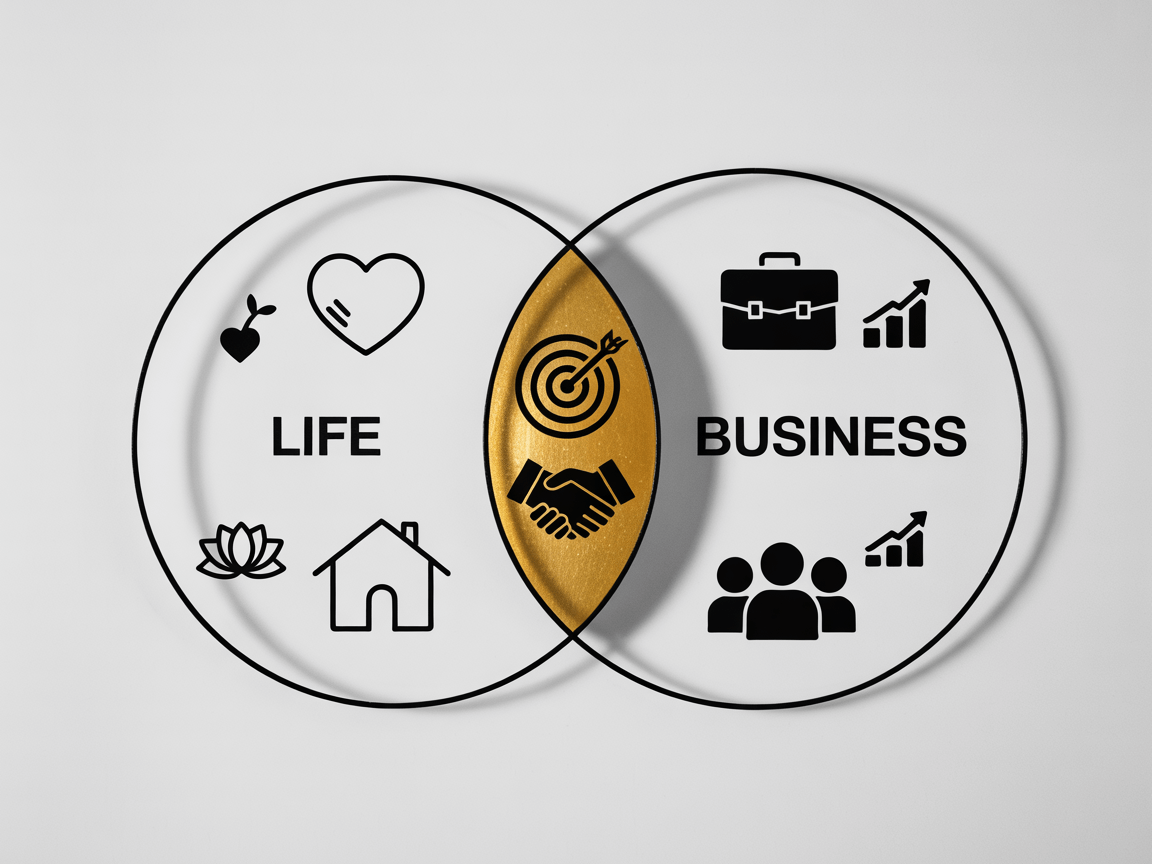
Use this systematic approach to determine which type of coaching best serves your current needs.
Step 1: Clarify Your Primary Objectives
Ask yourself:
- What’s the main area where you want to see improvement?
- Are your challenges primarily personal or professional?
- What would success look like in 12 months?
- Which areas of improvement would have the most significant impact on your overall satisfaction?
If your answers focus on business growth, leadership development, or career advancement, business coaching is likely
more appropriate.
If your answers centre on life fulfilment, relationships, health, or overall life direction, life coaching might be the better choice.
Step 2: Assess Your Current Life-Work Balance
Consider your current situation:
- Are you struggling professionally but satisfied personally?
- Are you successful at work but unfulfilled in other life areas?
- Do your professional and personal challenges seem interconnected?
- Which area, if improved, would positively impact the others?
This assessment helps you understand whether addressing professional challenges or personal development will have the greater overall impact.
Step 3: Evaluate the Urgency and Specificity of Your Needs
Business coaching is typically better for:
- Specific, measurable business challenges
- Time-sensitive professional decisions
- Industry-specific guidance
- Skill development with clear professional applications
Life coaching is typically better for:
- Exploratory personal development
- Values clarification and life design
- Holistic life improvement
- Personal transitions and major life decisions
Step 4: Consider Your Learning Style and Preferences
Some people thrive with:
- Structured, outcome-focused approaches (often better suited to business coaching)
- Exploratory, values-based development (often better suited to life coaching)
- Practical, implementation-focused guidance (business coaching strength)
- Reflective, insight-oriented growth (life coaching strength)
Step 5: Assess Your Investment Capacity and Expected Returns
Consider both:
- Your available budget for coaching
- The potential return on investment from each type of coaching
- The time frame for seeing results
- The sustainability of improvements gained
When You Might Need Both Types of Coaching
Many successful individuals benefit from both life and business coaching, either simultaneously or sequentially.
Sequential Approach
You might start with life coaching to gain clarity on values and direction, then move to business coaching to implement specific professional strategies aligned with those values.
Alternatively, you might begin with business coaching to address immediate professional challenges, then engage a life coach to ensure your success is sustainable and fulfilling.
Simultaneous Approach
Some people work with both coaches concurrently, using each for their areas of expertise. This requires careful coordination to ensure the coaches’ approaches complement rather than conflict with each other.
Integrated Approach
Many experienced coaches blend both approaches, though they typically have a primary specialisation. When choosing a coach who offers both services, ensure they have genuine expertise in the area that’s most important to you.
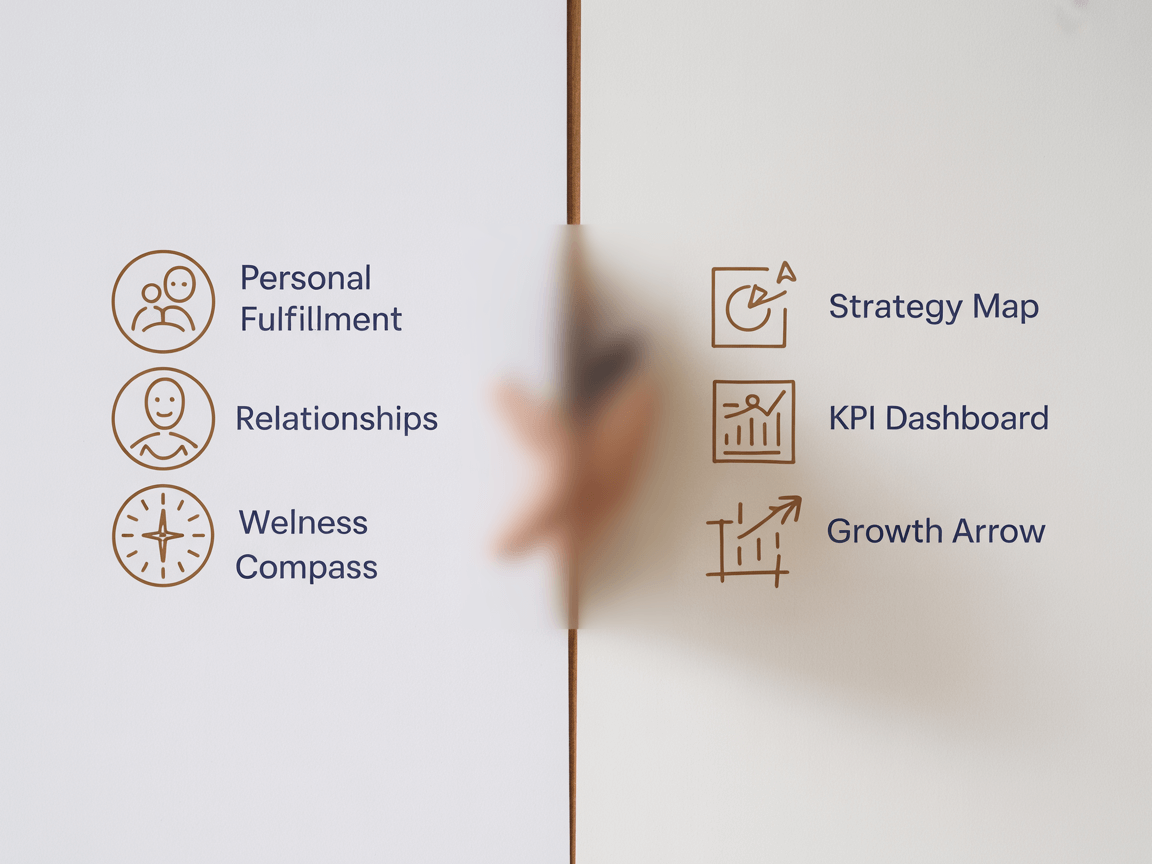
Red Flags to Avoid When Choosing Any Coach
Regardless of whether you choose life or business coaching, watch for these warning signs:
Qualification and Experience Red Flags
- No relevant coaching qualifications or business experience
- Unwillingness to provide references or case studies
- Guarantees of specific outcomes (coaching doesn’t work that way)
- Pressure to sign long-term contracts immediately
Approach and Methodology Red Flags
- One-size-fits-all approaches without personalisation
- Focus on their own agenda rather than your goals
- Inability to explain their coaching methodology clearly
- Excessive focus on their own achievements rather than client results
Professional Conduct Red Flags
- Inappropriate personal relationships or boundary violations
- Lack of confidentiality or professional ethics
- Financial pressure or upselling to additional services
- Poor communication or unreliability
Check out for these 5 early signs that tell if you need a business coach
Making Your Decision: Questions to Ask Potential Coaches
Before choosing any coach, ask these essential questions:
For Life Coaches:
- What’s your approach to helping clients create lasting life changes?
- How do you handle the intersection between personal and professional challenges?
- What qualifications and ongoing training do you have?
- Can you provide examples of clients with similar goals to mine?
For Business Coaches:
- What relevant business experience do you bring to coaching?
- How do you measure success in coaching relationships?
- What’s your approach to confidentiality in business coaching?
- Can you provide case studies relevant to my industry or challenges?
For Both Types:
- What does your typical coaching process look like?
- How do you ensure accountability and progress tracking?
- What happens if we’re not a good fit?
- What ongoing support do you provide between sessions?
Your Next Steps: Taking Action on Your Coaching Decision
Now that you understand the differences between life and business coaching, it’s time to take action.
The most crucial step is honest self-assessment of your current priorities and challenges. The more precise you are about what you want to achieve, the easier it becomes to choose the right type of coaching support.
Consider starting with a consultation with coaches from both categories if you’re genuinely unsure. Most professional coaches offer discovery sessions that allow you to experience their approach before making a significant investment.
Remember that coaching is an investment in your future – both personal and professional. The right coach can accelerate your development, help you avoid costly mistakes, and provide the accountability and support you need to achieve your goals.
The key is taking action. Whether you choose life coaching, business coaching, or a combination of both, the important thing is committing to your own development and growth.
Your future self will thank you for making this investment in your potential. The question isn’t whether coaching will benefit you – it’s which type of coaching will deliver the greatest value for your current situation and objectives.



